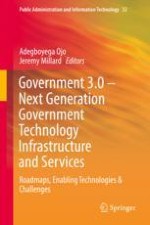
2017 | OriginalPaper | Chapter
European Strategies for e-Governance to 2020 and Beyond
Author : Jeremy Millard
Published in: Government 3.0 – Next Generation Government Technology Infrastructure and Services
Publisher: Springer International Publishing
Activate our intelligent search to find suitable subject content or patents.
Select sections of text to find matching patents with Artificial Intelligence. powered by
Select sections of text to find additional relevant content using AI-assisted search. powered by